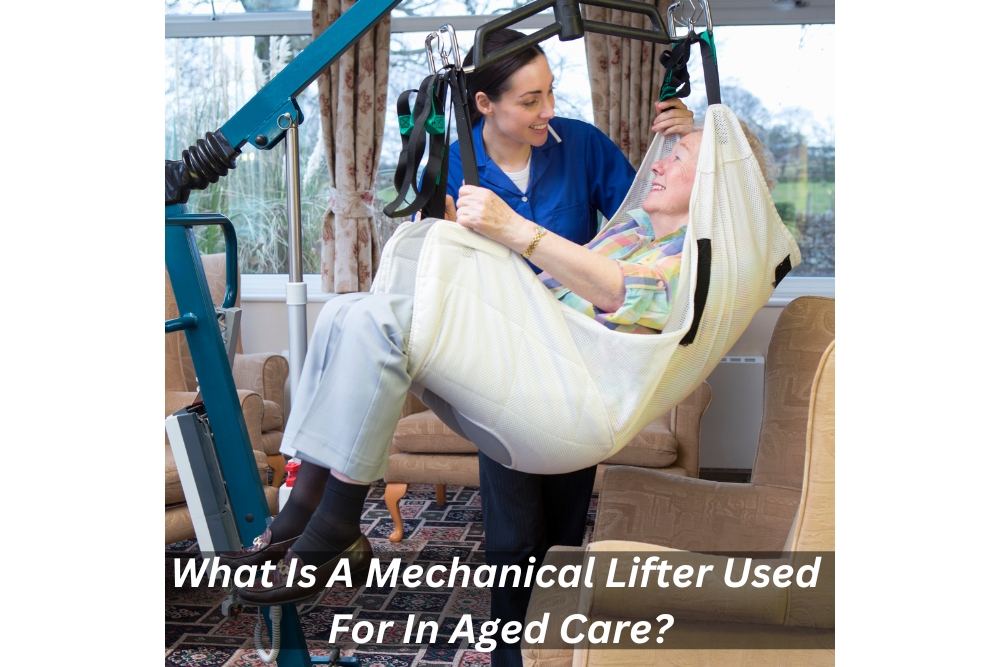Are you looking for a mechanical lifter to provide elderly people with a safe and comfortable means of transferring from one location to another? This equipment is just one of the many living aids that can help elderly people. You will learn more about this equipment in this blog.
As we get older, it can be increasingly difficult to take part in activities that once seemed effortless. Unfortunately, this includes things like getting out of bed or navigating stairs. Therefore, elderly individuals require assistance when it comes to everyday tasks and mobility. In aged care, a mechanical lifter is an important piece of equipment that helps caregivers move individuals safely and comfortably from sitting to standing.
For those looking at incorporating mechanical lifting into their aged care service, many important factors should be considered before making a purchase. Here’s an overview – what is a mechanical lifter used for in aged care, and how can it benefit elderly individuals?
A mechanical lifter is a device used to move and handle elderly individuals from one place to another. It can be used to transfer them from their bed to a wheelchair, or from a chair to the toilet. It can also be used for standing lifts, which help elderly people stand up without assistance. This equipment eliminates the need for manual handling, reducing the risk of injuries and improving quality of life.
Mechanical lifters come in a wide range of shapes and sizes to suit different needs. They can be operated manually or powered by electricity, depending on the user’s preference. When selecting a mechanical lifter, it is important to consider factors such as weight capacity, ease of use, and safety features. Additionally, it is important to ensure that staff members are adequately trained in using the equipment and that the facility has the necessary safety measures in place.
How do caregivers ensure the device is safe when transferring an elderly patient with a mechanical lifter?
When transferring an elderly patient with a mechanical lifter, caregivers must ensure that the device is safe and secure. Caregivers should always read the instructions carefully before using the device and make sure that all safety features are engaged. Additionally, they should check to make sure that all straps and transfer belts are properly secured and adjusted to fit the individual’s size.
Caregivers should also be aware of the individual’s weight and make sure that the device is able to support it. Finally, caregivers should always be present during the transfer and monitor the individual for any signs of discomfort or distress.
Are there risks associated with using mechanical lifters in aged care?
Yes, there are risks associated with using mechanical lifters in aged care. As with any medical device, there is a risk of injury or harm if the device is not used properly. Caregivers should check to make sure that all straps and belts are properly adjusted and secure before use. Finally, caregivers should ensure that the device is regularly serviced and maintained to ensure its safety and effectiveness.
What types of mechanical lifters are available for use in aged care?
When it comes to selecting a mechanical lifter or patient lift for use in aged care, there are several different types available. These include full-body slings, transfer boards and slide sheets, ceiling lifts hoists, mobile hoists, ceiling tracks, c and standing lifts. Mechanical lifters are tailored to the needs of an individual to provide secure and relaxed transportation. Additionally, some mechanical lifters can be power sourced by electricity or manually operated, depending on the user’s preference.
How do you safely use a mechanical lifter in aged care?
When using a mechanical lifter in aged care facilities, it is important to ensure that the equipment is used safely and correctly. All staff members should be adequately trained in the use of the equipment and familiar with all safety procedures.
Before using a mechanical lifter, it’s important to assess the individual’s needs and select the appropriate type of lift for their situation. Additionally, it is important to ensure that the individual is securely fastened into the lift and that all safety measures are in place. Finally, it is important to ensure that the equipment is regularly serviced and maintained according to the manufacturer’s guidelines.
Is there any special training needed to operate a mechanical lifter in an aged care setting?
Yes, there is special training needed to operate a mechanical lifter in an aged care setting. Caregivers should be trained in the proper use of the device and familiar with all safety procedures. This article about the proper use of mechanical lifters will give you more insights.
This includes understanding how to properly assess the individual’s needs and select the appropriate type of lift for their situation, as well as how to securely fasten them into the lift and ensure that all safety measures are in place. Additionally, caregivers should be trained in how to properly service and maintain the equipment according to the manufacturer’s guidelines.
How often should a mechanical lifter be serviced and maintained for optimal performance?
In order to ensure optimal performance, a mechanical lifter should be serviced and maintained on a regular basis. The frequency of servicing and maintenance will depend on the type of mechanical lifter being used, as well as the environment in which it is being used. Generally speaking, mechanical lifters should be serviced at least once every six months, or more frequently if they are being used in an environment with high levels of dust or moisture. Additionally, all parts should be checked for wear and tear and replaced as necessary.
What features should I look for in a mechanical lifter for aged care?
When selecting a mechanical lifter for use in aged care, there are several features to consider. Firstly, it is important to ensure that the lift is of an appropriate size and weight capacity for the individual.
Additionally, it should have adjustable height settings and be easy to maneuver. Additionally, it should be equipped with secure straps or harnesses and brakes or locks to ensure safety. Finally, it should be easy to maintain and service. Here is an additional resource when you are using mechanical lifters with a hoist. It is very easy and convenient to get this equipment. If you need to hire or buy them, you can just visit this link.




